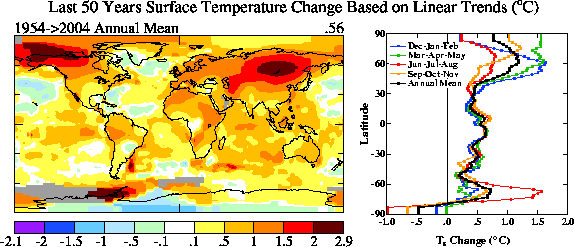State of Fear, pick my timeseries
Following on from this.
Well, with 170+ references, there is an implication that his facts are good, but his attention to detail is not so good, or perhaps we just need to remember it’s fiction. Anyway, the Hadley Centre isn’t in East Anglia (perhaps he’s confused the Climate Research Unit at the University of East Anglia, with the Hadley Centre for Climate Prediction and Research, based mainly in Exeter).
More importantly, from page 84 onwards, Crichton starts showing some carefully selected graphs to make some points. In particular, he shows
- Global Temperature, 1880-2003, using GISS data.
- Same again, but with carbon dioxide overlaid
- Same again, but only looking at 1940-1970.
- The timeseries of US temperatures 1880-2000.
He appears to be using these to attempt to make the following points:
- A: carbon dioxide and temperature don’t always follow each other.
- B: the U.S. temperature data is obviously the best in the world, the U.S. is big enough to represent the rest of the world anyway, and since that doesn’t show a significant warming until post 1970, then it isn’t real.
Firstly A. Let there be no misunderstanding. All other things being equal, increasing global mean carbon dioxide must increase the global mean temperature. If this were not true, we would live on a frozen planet! We know this (No serious scientist denies this as far as I know). However, all things are not always equal, and as we will see there are issues with, particularly, clouds. Also, let’s not forget natural variability. Natural variability occurs on a range of timescales, and is bound to result in periods (even decades) where the carbon dioxide signal and the temperature signal will not align. In the long term though, they just have to! The real questions should be:
- C: Is the observed carbon dioxide increase manmade?
- D: Is it large enough in magnitude for the atmospheric response to swamp natural variability?
- E: Are there other parts of the system that might respond before temperature, and produce feedbacks which might stop a significant global temperature increase?
All the available evidence suggests: C: yes, D: yes, E, No. That’s why all the refereed literature agree on this point.
Let’s deal with his assertion (B) that the U.S. data is the only data that matters. Leaving aside the breathtaking arrogance of this position (no one else can maintain quality recordings!), remember that the land area of the U.S. is about nine million square km. Roughly six percent of the land area of the globe, or about 2.5 percent of the global surface area. So, actually, his assertion that because of the size, it has relevance for the globe is nonsense. So now, let’s look at some pictures he didn’t choose to show. Here, from the same site as he got his data from are some figures he doesn’t want to show:

Hmmm …
It looks like that when you use all the data, we learn that the warming problem is not the same at all places and all latitudes, and so the American figures are not the whole story - but even they show a significant increase in temperature in the last three decades. Note that GISS explain in some detail what data they use and how trustworthy it is!
Sometime, if I have the energy, I’ll put up some time series from some other locations …
Appropriate Use of Facts: 0, Misuse: already too big to count.
On page 188, we have the following exchange, I’ve added some parenthetical clause numbering so I can rebut the conversation:
... No one can say for sure (1) if global warming will result in more clouds, or fewer clouds (2) ... global warming will raise the temperature, so more moisture will evaporate from the ocean, and more moisture means more clouds (3) ... but, higher temperature also means more water vapor in the air, and therefore fewer clouds (4) ... so which is it? Nobody knows (5) ... so how do they make computer models of climate ... As far as cloud cover is concerned they guess (6) ... well they don't call it a guess. They call it an estimate, or parameterisation, or approximation (7). But if you don't understand something, you can't approximate it (8). You're just guessing (9).
Oh dear, oh dear. In my disclaimer, I should have said, I’m a dynamacist who specialises in parameterisation. Now this is something I do know something about. But I haven’t time for this now. Expect me to come back and comment all these points too …